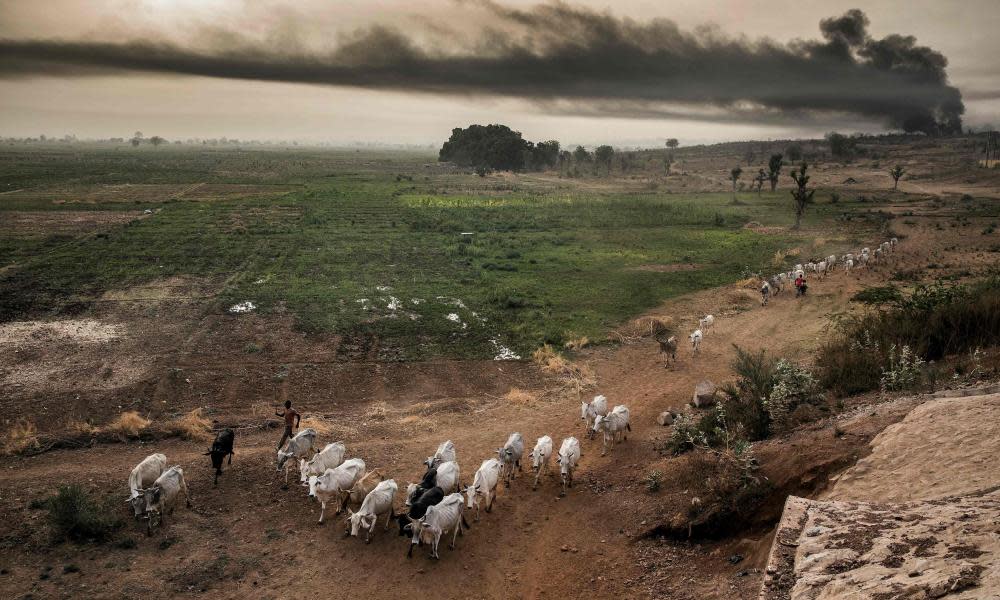Waves of ‘bandit’ massacres rupture rural life in north-west Nigeria

In the morning, reassurance, in the evening, another mass killing.
When the governor for Sokoto state in north-west Nigeria arrived in Sabon Birni, a district reeling from relentless killings by armed groups, he assured local officials that authorities were in control. Police reinforcements would arrive soon, he added.
Just hours after the governor left the town, 20km from Nigeria’s northern border with Niger, more than 70 people were killed in five villages in the district. The brutal details of the massacre, which took place on 26 May, mirror countless similar attacks by suspected “bandits” across north-western Nigeria and increasingly, southern Niger.
A hoard of more than 100 heavily armed assailants on motorbikes, from camps in the nearby Isah forest, stormed towards the villages, gunning down residents and destroying property, eyewitnesses said.
Desperate villagers called the local police but, as is common when heavily armed attacks are imminent, no one arrived.
“I am in shock seeing these bodies, we’ve recovered 74 corpses,” said Lawali Kakale Gobir, who lives in a nearby village.
Incessant killings by criminal groups – referred to locally as bandits – are rupturing rural life in one of the poorest parts of the world.
The specific motives for the killings in Sabon Birni are unclear, but the underlying causes fuelling massacres across the region are glaring.
For more than a decade, the area has suffered from incidents of armed robbery and cattle rustling, but as competition for land and resources between ethnic Fulani herders and local farmers has intensified, attacks have become more frequent and more violent. Although “banditry” encompasses a range of criminal activity conducted along various non-ethnic and ethnic factors, many of the recent large-scale armed attacks have been carried out by suspected Fulani assailants.
Many Fulanis – nomadic pastoralists who span west Africa – face the twin threat of climate change and rapid population growth, both of which have diminished available land.
In Nigeria, herders are encroaching on private landmore frequently as grazing reserves disappear. As such, historically muted disputes between Fulani pastoralists and farmers of various ethnicities over land resources have rapidly intensified.
“There is a long history of Fulbe (Fulani) and Hausa people living peacefully and having strong friendships and business ties,” said Chitra Nagarajan, a conflict researcher in Nigeria. “However, many Fulbe people, particularly in more rural areas, have felt not only completely marginalised from government interventions but that policies and programmes, for example the selling of grazing land, have reduced their livelihoods.”
Hausas think Fulani grievances are unfounded and given disproportionate attention, she said.
Widespread poverty has heightened the appeal of armed criminality as a way of life. Kidnappings for ransom have become commonplace. Pastoralist life faces threats around the world, but in Nigeria the violence has been catalysed by poverty, a failure of local justice and ethnic divisions.
Almost 70,000 people have fled north-west Nigeria to Niger since April 2019, including 30,000 in the last two months. According to the International Crisis Group, 11,000 people have died since 2011. Many deaths, particularly in Fulani communities, go unreported.
Several army operations have been launched, but most have been largely ineffective.
State governments in the region have resorted to signing controversial and secretive peace agreements with bandits and vigilantes to stop the killings. But the deals soon unravel.

According to Selim Meddeb Hamrouni, a reporting officer at the UNHCR refugee agency in Maradi in south-west Niger, the armed groups have grown more active there, spreading north from Nigeria.
“This 20km band inside the Nigerien border is where we’re seeing attacks happening time and again,” Hamrouni said.
The UNHCR is moving refugees in Niger into towns further inside the country. Niger is already struggling to contain jihadist violence on its soil, and is overburdened with refugees from surrounding countries and internal displacement.
Bandit attacks have forced a steady exodus from areas such as Sabon Birni, said Abdu Dan Ige, a 40-year-old health worker.
His village had been peaceful for all his life but is now restless. “We cannot hold even wedding ceremonies without bribing the bandits for them to allow the social events to be held without violence,” he said. “Hardly a day passes without a village being attacked.”
Nigeria’s response is compromised by the decade-long war with jihadists in the north-east. With security forces stretched, armed groups have been able to operate with little resistance in the north-west.
Murtala Rufa’i, a politics and security researcher in Sokoto, said the vast, mineral-rich forests that stretch across northern Nigeria into Niger and the Sahel have become a haven for the groups.
“The forests are vital,” said Rufa’i. “It is vast and not well understood except by the groups that use them, particularly Fulanis because of their pastoralist roots. They’ve used forest tracks to import caches of heavy weapons.”
Nigeria’s north-west and its porous border with Niger is gradually reconfiguring into a nexus for armed groups, he said. In many cases the groups are becoming more heavily armed than local police forces.
A growing concern is that jihadists fleeing pressure in the north-east and coming south from Niger could establish roots in the north-west.
“We’ve seen some jihadist elements try to establish connections with bandit groups,” Rufa’i said. “They’ve so far been unsuccessful but jihadists could see the region as ripe for gaining a foothold and exploiting local grievances.”


